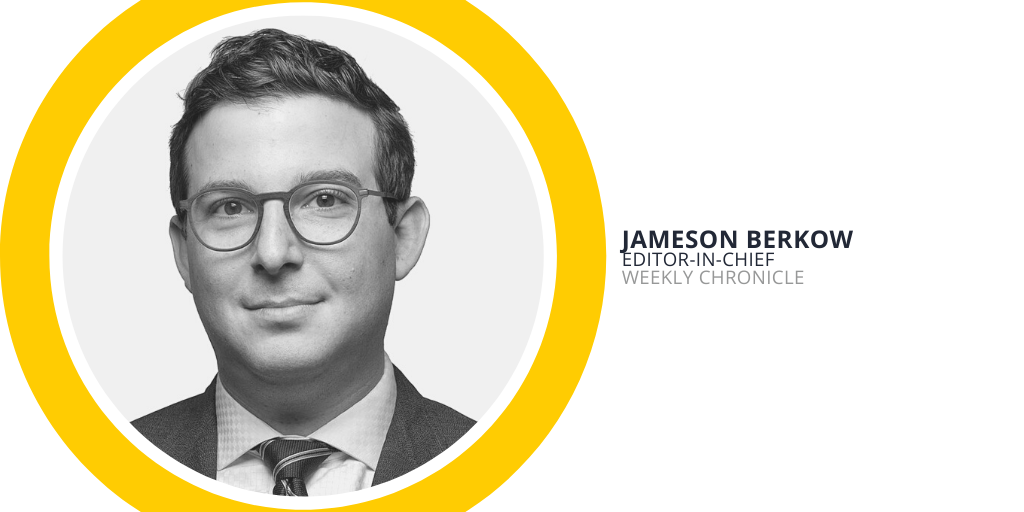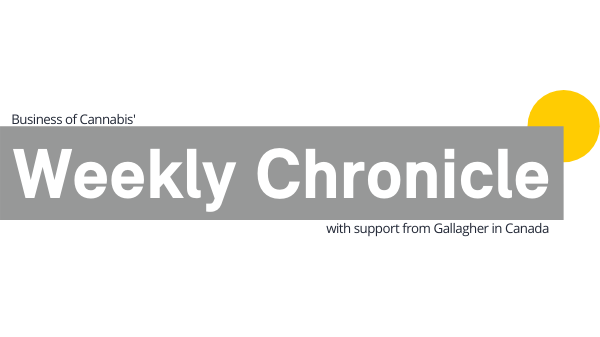From the Editor
If you’re reading this, then congratulations! We have reached the end of a very long road together. Finding the right home for the cannabis journalism you deserve has taken us past Canada’s national newspaper and a cannabis-focused venture capital firm before arriving here, but rest assured we have finally reached our destination.
Jay Rosenthal and the Business of Cannabis team share our desire for reporting that treats the end of cannabis prohibition with the seriousness it deserves. They want what we want: a publication capable of stepping back and assessing the consequences of this brave new world legalization has spawned. They also recognize such a publication must be strictly independent from any commercial interests if it is to have any credibility, but that it cannot be given away for free.
Weekly Chronicle will serve as a curious mind and a critical eye tuned to those fast-moving trends, provoking thoughts and stirring pots every Thursday morning along the way. That begins today with a detailed look at what we know – or, rather, what we thought we knew – about the cannabis ‘entourage effect’.
What we cover next partially depends on you: feedback, suggestions and ideas are aggressively encouraged. After all, Weekly Chronicle is your home just as much as it is mine.

Inside the Cannabis ‘Entourage Effect’
by Jameson Berkow
It does exist. Effects from a ‘whole plant’ experience will be different from those produced by THC or CBD alone, but anyone who claims those effects are predictable is lying to you. Understanding what the entourage effect actually *does* would cost upwards of US$75-million, scientists say, and with companies already making specific claims with impunity there is zero motivation to spend that cash.
One puff and hundreds of chemicals inside cannabis flower go to work on your biochemistry, producing uniquely powerful effects; far more powerful than anything that might be produced from individual cannabinoids such as THC or CBD.
That is the allure of the cannabis entourage effect. It suggests the most common production model being pursued in legal cannabis markets today – one focused almost exclusively on maximizing output of no more than one or two components of the cannabis plant – is doomed to fail.
As research advances on producing THC and CBD at scale without having to actually grow plants, scientific debate is raging over whether the industry is leaving potentially critical components behind.
“The current wave of excitement in cannabis commerce has translated into a flurry of research on alternative sources, particularly yeasts… but these presuppose that single compounds [such as THC or CBD] are a desirable goal,” Ethan Russo, a doctor who spent more than a decade as a senior medical advisor with GW Pharmaceuticals, wrote in the January 2019 edition of the journal Frontiers in Plant Science. “Rather, the case for cannabis synergy via the ‘entourage effect’ is currently sufficiently strong as to suggest that one molecule is unlikely to match the therapeutic and even industrial potential of cannabis itself as a phytochemical factory.”
This issue of Weekly Chronicle is part of a 4-week free trial. Until October 16, take advantage of our introductory offer for just $99/year.
The cannabis entourage effect “is not a myth”, Todd Michael, former head of the Monsanto Genome Analysis Centre and current research professor at the Salk Institute for Biological Studies, said in an interview. “It is true. It is just that there hasn’t been extremely good science to really support it one way or another.”
Of the little research that has been done on the entourage effect, medicinal chemist Peter Cogan warns companies regularly misrepresent the results of those studies to highlight only positive entourage effects. Having reviewed the available literature on the subject in a recent issue of the Expert Review of Clinical Pharmacology, Cogan warns negative entourage effects are just as likely.
In one study published in early 2020, the researchers “found that, sure enough, when you combined a couple of these components you get the actual killing of cancer cells, and that is what gets reported in the abstract, that this particular combination prevents cancer cell growth pretty effectively,” Cogan said in an interview. “That is what comes through and that is a perfectly legitimate paper. The problem comes when you look at their data, you’ve got another entourage that actually increases cell viability in cancer cells by 150 per cent and pure CBD was doing the same thing to almost 175 per cent.”
“That means some [cannabis] entourages are actually fueling the growth of cancer, so how do we know which combination is going to be beneficial and which one is going to be a net harm?” Cogan said.

Answering that question first requires a quick definition: If you’ve ever taken one Tylenol and one Advil instead of two of either, then you understand the concept of the entourage effect.
“We have no idea what Tylenol actually does, we just know it does something and we know it does something different than Advil so when you put them together you are actually getting that synergistic entourage effect not because they are helping each other do anything, but because they are doing two different things,” Michael explained.
“At some level, we do know that is the case with terpenes and cannabinoids, so just from first principles we know [the entourage effect] does exist because we know from other plant extracts that terpenoids have a huge impact on human physiology.”
“But we don’t know what that impact is when you bring them together with THC or CBD in different concentrations.”

Approximately 400 different chemical components are produced by cannabis and “they absolutely have effects on one another,” said Ben Chiarelli. “This is common in pharma. It is called combination therapy where you take one medicine and combine it with another medicine and they have synergistic effects. That absolutely exists.”
Chiarelli is CEO of Cellibre, described as a “cellular agriculture company” based in San Diego that is working on producing kilograms of pure THC, CBD and basically any other chemical concoction nature can produce without the need to grow a physical plant.
“This plant makes 400 different chemicals simultaneously and there is only so much room in those plant cells,” he said. “They can only make so much cannabinoid and that per cent of biomass is what drives all of our economics. And then for isolates and extracts you have to use things like chromatography and all of these technologies that don’t scale and are super expensive.”

Problems arise not when cannabis companies claim the entourage effect exists, Chiarelli and others argue, but the claims often go beyond what the science can support: that a specific entourage effect – or even a broadly positive one – will occur in the majority of consumers when they imbibe a particular strain.
“Those people are basically saying I am going to take 400 glass jars and fill them each with a different chemical, then I am going to take a spoon and take random samples from a handful of jars and that will be the magic potion. Then a month later I’m going to use a different spoon and use a different random sample from the 400 jars and then that will be the magic potion,” Chiarelli said. “It doesn’t make any sense.”
The claims are “ridiculous”, Cogan said, “about being able to cure diabetes and cancer and people eat this stuff up. I keep seeing these claims coming up constantly on social media and online anytime you try to search for information about cannabis in a therapeutic context.”
“You end up with people chasing these magical concoctions where there is not a whole lot of evidence that they are going to do anything,” Cogan said. “It becomes very frustrating to see an industry that pitches hope but are in fact abusing hope. They are preying on people who are desperate with whatever conditions they have and are willing to sell them absolute garbage.”
Expecting a full scientific understanding of the entourage effect is perhaps just another example of people asking too much, too quickly, of the post-prohibition world, Michael argues.
“Up until not that long ago if people wanted to get the entourage effect they would smoke a joint and get what they get and they’ll go back to the same supplier or the same plant and get the same effect every single time,” Michael said. “But in the brave new world of legalization that isn’t good enough anymore. We want to be able to quantify that. And the only way we can do that is through more testing.”
Eventually, Chiarelli believes cannabis will follow in the scientific footsteps of the humble vanilla bean.
“The vanilla bean makes over 170 chemicals and it wasn’t until a scientist in the early 1900s found that only one chemical captures most of the vanilla flavour,” Chiarelli explained. “Then the spice company McCormack did a deeper dive and found that it was about 25 chemicals out of the 170 that gave you the full essence of vanilla. Cannabis is going to be the same thing.”
Weekly Chronicle is made possible with support from:

Mapping out all 400 chemicals and determining how they interact with each other is an expensive proposition.
“In order to get through three phases of clinical trials and getting the proper data you need to answer these questions is a US$75-million proposition,” said Cogan. “And there is no impetus to do that in a marketplace that requires no evidence to make broad claims.”
Michael said the cost to “really understand something as complicated as the entourage effect” could be closer to US$100-million “to really conclusively show results [but] there just isn’t funding out there to do it.”
“I do think it is necessary and I do wish we could move towards that faster,” Michael said. “There doesn’t seem to be any reason that a plant that has been so important in human history isn’t receiving the kind of attention from a scientific research perspective that it deserves.”
























